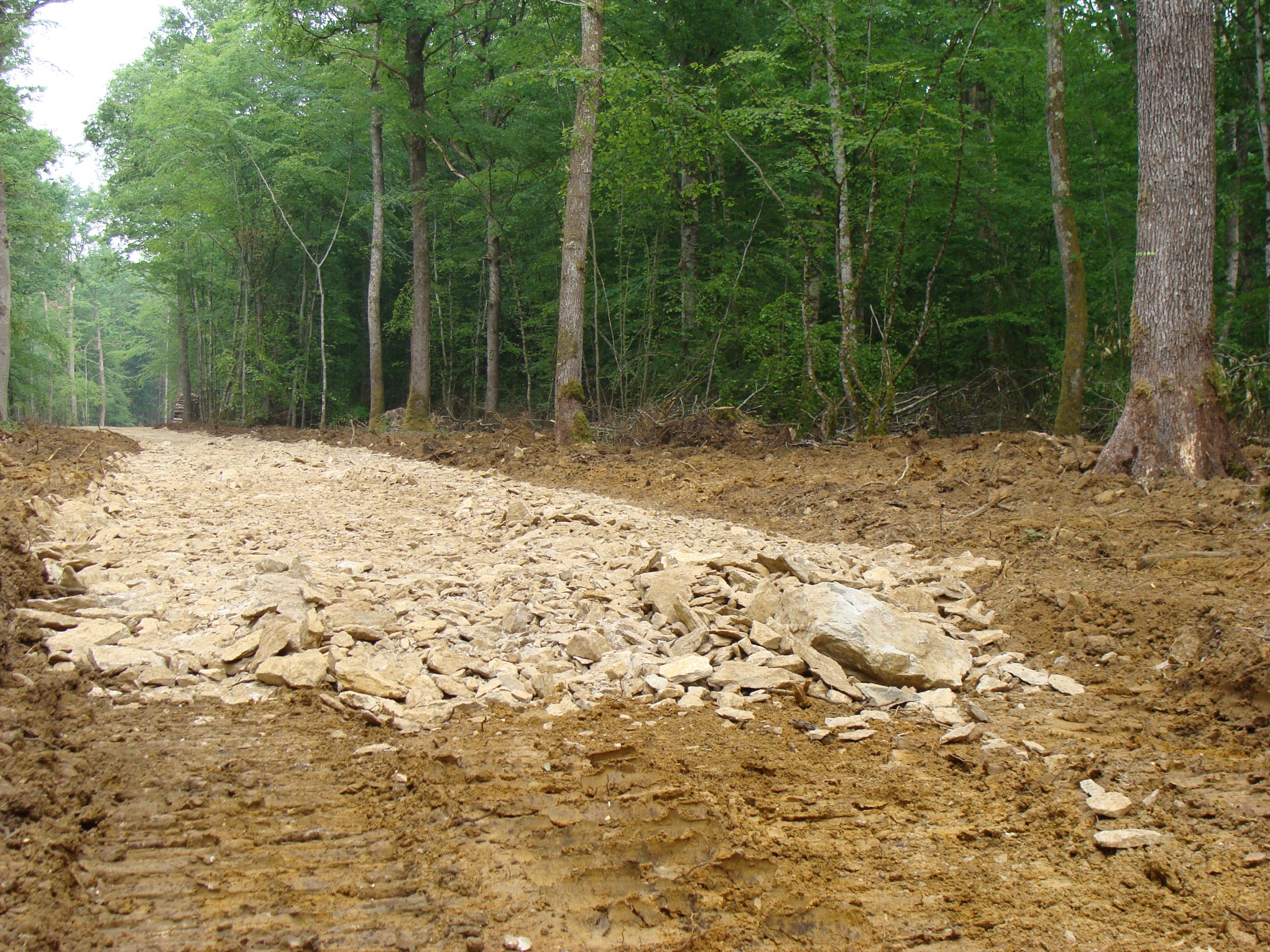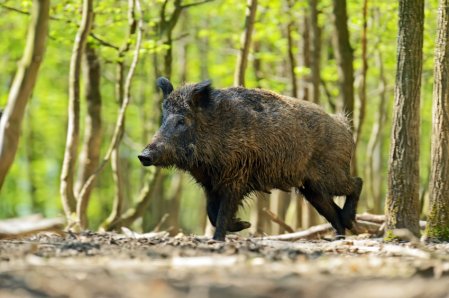FORESTRY MANAGEMENT
As regards the management of their forestry assets, the expectations of proprietors are increasing. They vary depending of their personal situation (age, financial situation, sensitivity, etc.) and the characteristics of the forest (species, tree density, operational time, etc.).
So it is necessary to build a management strategy which is suitable for the particular forest, but which also takes into account the objectives and the needs of each proprietor.
This personalised management, based on reciprocal trust, becomes imperative over time.
On the other hand, the management of a forest is not only about the sylviculture aspect. Optimisation of taxation, knowledge of the forest economy, the follow-up of the forest-wood business and the associated networks are essential for receiving the maximum value from a wooded holding.
Mastery of these various aspects of forest management enables us to accompany proprietors at all stages of their investment projects.
Administrative management
The writing of management documents (Simple Management Plan, Code of Good Forestry Practices, etc.), in accordance with the objectives fixed with the owner, provides the organisation of the various forestry activities and enables planning of the revenue and the expenses for the years to come.
To guarantee regular follow-up of the properties, the management documents are supplemented by provisional budgets in which the financial flows are detailed.
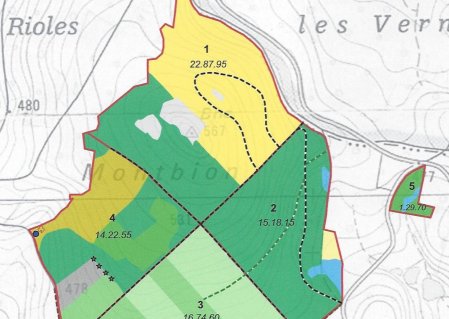
The use of a special mapping software (Geographical Information System – MAPINFO and QGis) and the use of GPS allows for a detailed map of the forest stands.
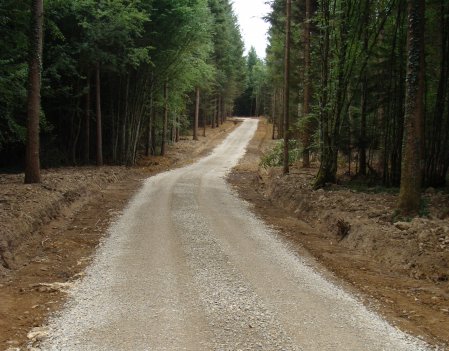
The costs of making this road, which is situated in the county of Dixmont (Yonne), is in the order of 80.000€ (without VAT) per kilometre. With a length of 3200 meters, it traverses the combined forest area of close to 300 hectares, belonging to several owners.
This project benefited from grants of 80% of the total amount of the investment (without VAT) from the European Union (FEADER), the French state and the Regional Council of Bourgogne.
When the planning of a forest needs heavy investment (forest roads, wood storage area, replanting, etc.), a forest proprietor has the possibility, under certain conditions, to have access to public subsidies.
These financial aids can be granted by Europe, the State, the Regional Councils and, in certain cases, the General Councils.
At present, the rate of available subsidies varies from between 30% and 80% of the total amount of the investment excludind VAT.
Our involvement within the industry guarantees that we are constantly informed of the possibilities of access to these financial supports. We therefore accompany the forestry proprietors in the establishing of dossiers requesting subsidies and the receipt of public aid.
- Administrative management of forestry holding companies (and other civil companies)
The constitution of forestry groupings or rural land-holding companies is becoming generalised.
These civil property companies, specialising in the management of forestry and rural assets, enable the ownership of a domain to be shared, to be managed and to be transmitted without being forced to divide it.
In collaboration with notaries and lawyers, we accompany investing forest owners. These structures necessitate a management structure: administrative, fiscal and legal.
At present we provide the follow-up of about fifty forest and rural land holding companies with various degrees of involvement. The partnerships that we have established with management centres with accounting experts; lawyers and barristers enable us to keep ourselves informed concerning the development of regulations and to apply them to the management of the forest and rural land holdings.
Depending on the geographical situation, the composition of the forest and the type and density of the game, rental of the hunting rights can constitute a significant revenue for the owner.
At present, our office manages nearly 80 rental leases for hunting rights in Burgundy and the neighbouring departments.
Although the average is around 20,00 €/ha/year, the rental of a hunting territory can fluctuate by a few euros
per hectare and per year in the Morvan to more than 100,00 €/ha/year for the most coveted forests.
Administrative management
The writing of management documents (Simple Management Plan, Code of Good Forestry Practices, etc.), in accordance with the objectives agreed with the owner, provides the organisation for the various forest activities and enables planning of the revenue and the expenses for the years to come.
To guarantee regular follow-up of the properties, the management documents are supplemented by provisional budgets in which the financial flows are detailed.
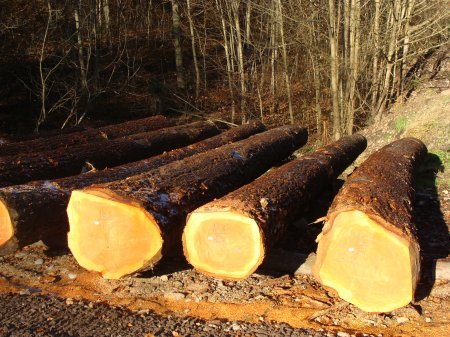
These logs of Douglas of exceptional quality were exploited from a forest in Morvan.
- The arrangement and the selling of felled wood
Every year, we present on the market over 50,000 m³ of hardwood and coniferous wood. Depending on the characteristics of the lots of wood (species, overall volume of the felling, unit volume of trees, geographical situation, quality of the transport, etc.), the fellings can be proposed in auctioned sales (putting the buyers in competition with each other) or negotiated amicably with forestry operators selected for the quality of their work.
Our Office accompanies owners for the organisation, follow-up and acceptance of forestry works (replanting, maintenance of plantations, rate of training, thinnings, etc.).
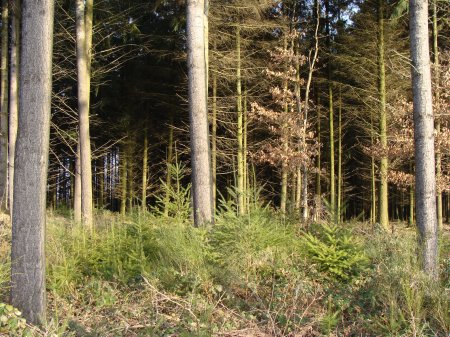
To the extent that it is possible, the sustainability of forest stands, both deciduous and coniferous trees, is ensured through natural regeneration. This step of the forest management requires a lot of observation and a bit of forest work (clearance and suppression of competing tree species).
From our experience, we have noticed, that obtaining a natural regeneration is 3 to 4 times less expensive than a reforestation.
The cost of a natural regeneration of Douglas-fir very rarely exceeds 1 000 €/ha against 4 000 to 4 500 €/ha for a plantation with a density of 1 330 trees/ha.
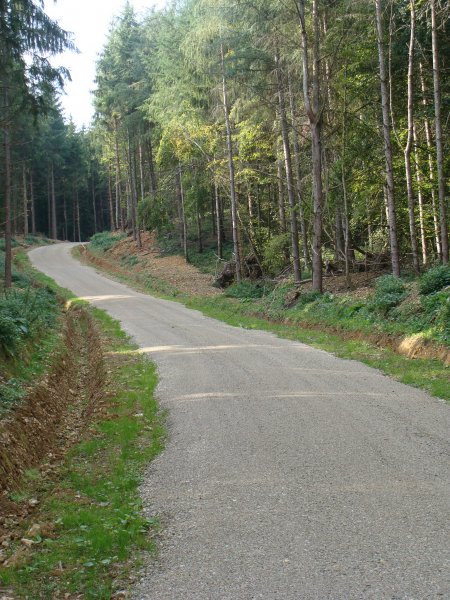
This road infrastructure of a length of 2350 meter provides adequate access for a production forest of 280 ha, which lies in the county of Lacour d’Arcenay, in Côte d’Or.
The forest road ends at a turning point that allows the logging trucks to manoeuvre. This means that the exploited timber has a maximum of 400 meters to a forest road accessible to logging trucks.
- The concept of infrastructures
Tracks and roads are essential for the correct management of a forest. The creation of forest roads and depots are complex worksites both when completing financial dossiers ( looking for and arranging of maximum subsidies, designing grouped projects, etc.) and also in the organisation, the follow-up and the axecution of the works.
Each year, we provide the main contracting for creation of worksites for forest roads with a combined lengh of between 5 and 10 kilometers.
.
Accounting and taxation management
Whatever may be the area of the land, forest owners can be made subject to VAT (voluntary commitment becomes compulsory when the average amount of the sale of wood reaches on an annual basis the sum of 46 000,00 € not incl. VAT).
These fiscal formalities then require simple accounting to be kept up. Our office can supply its support to proprietors for the registration of accounting documents, calculate the VAT balance and prepare the tax declarations to be sent to the taxation office.
Our wish to accompany owners at the various stages in the management of their forests leads us to supply our help in order to satisfy the numerous taxation formalities such as a request for the ISF or MONICHON certificate, an ISF declaration, the calculation of the land registry revenue of a forest or a 2072 declaration 2072 for a forest hoding or a rural land revenue hoding, etc.).
These provisions are generally the origin of partnerships with management centres or accounting experts
Legal assistance
The management and the operation of a forest are subject to numerous regulations (forestry law, rural law, environmental law, territorial collectivity law, urban law, taxation law, etc.).
Sometimes it is difficult to find one’s way when meandering through all these rules..
We keep ourselves regularly informed of the development of these laws and more particularly their means of application.
Recourse to notaries, specialist barristers and lawyers is sometimes necessary to study the most complex of these situations.
Click here to see some legal news about the forestry business.
